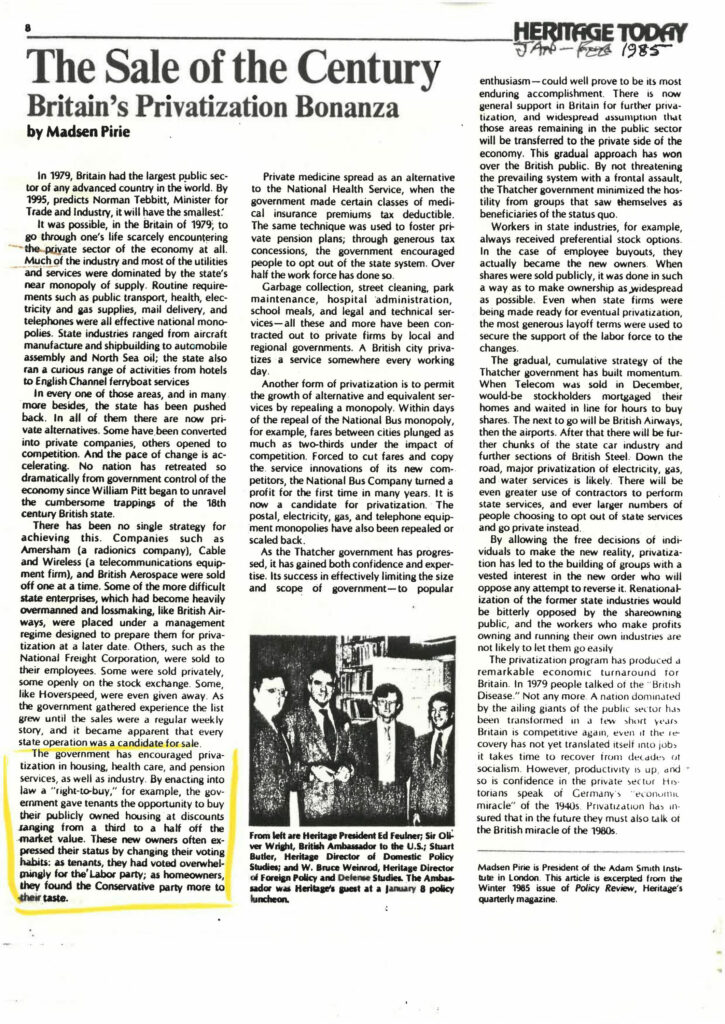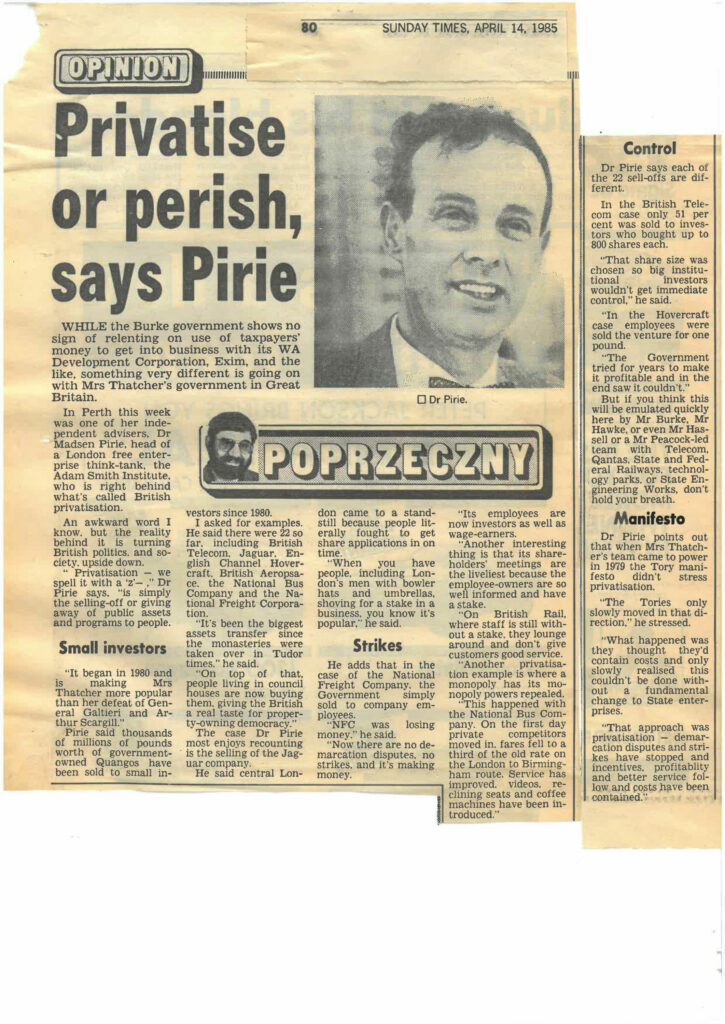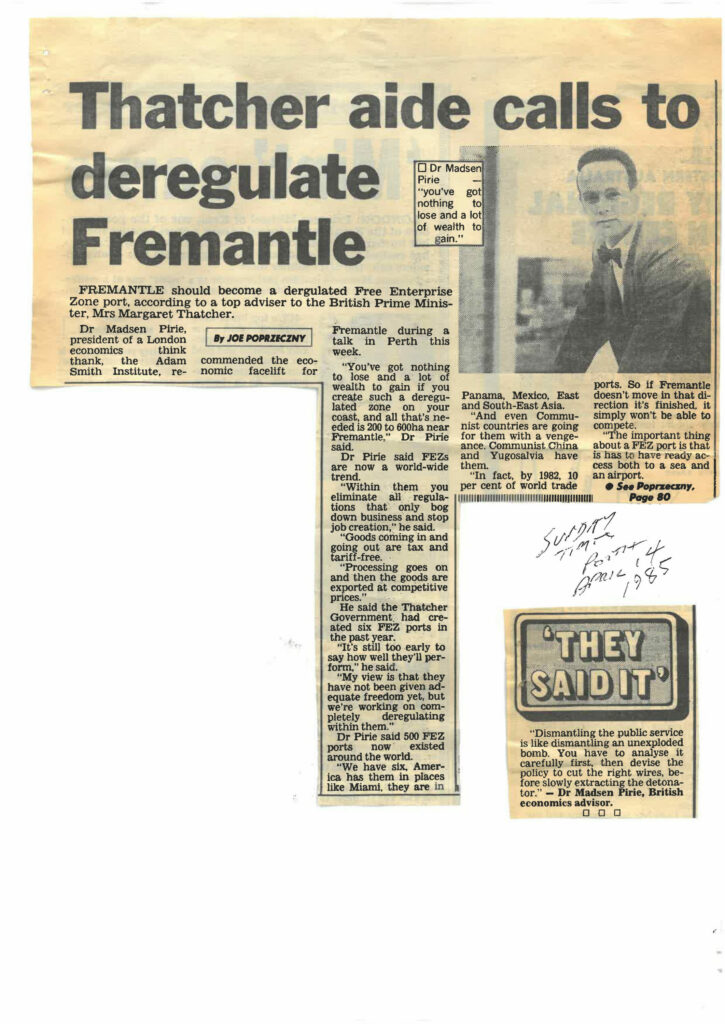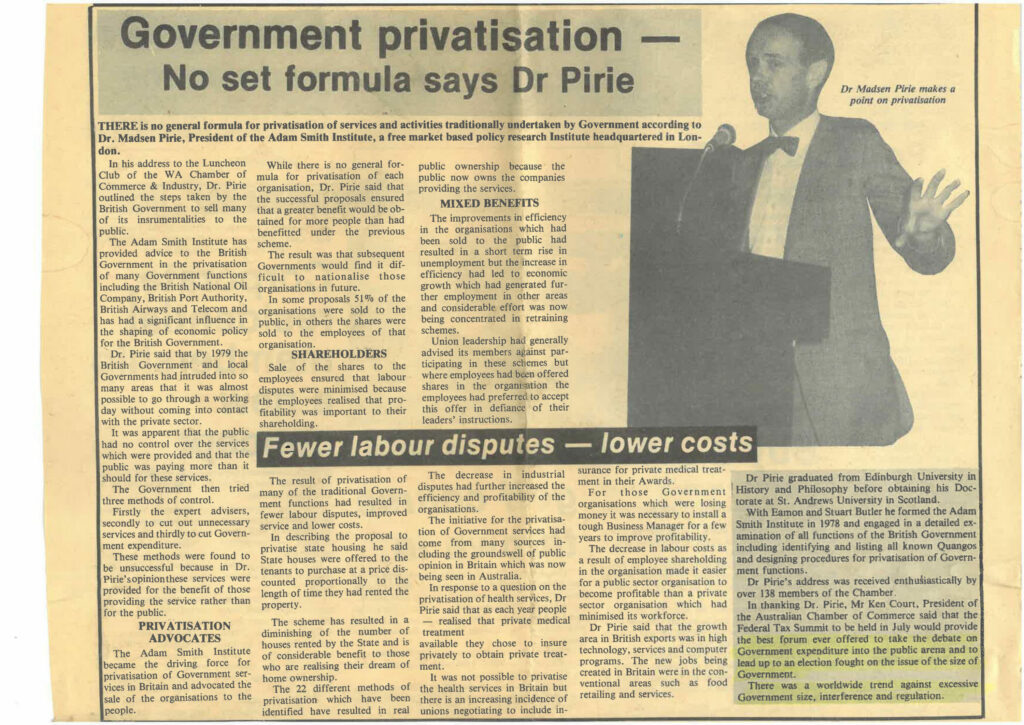Privatisation was a welcomed addition to our vocabulary during the 1980s.
It was an essential part of the Thatcher Revolution in the United Kingdom (P.M. Margaret Thatcher 1979-1990).
Privatisation was seen, by many, to be an effective method of revitalizing stagnant industries and other government-owned entities, and the world started to take notice.
That world included Australia, then suffering under the burden of the combination of heavy-handed government and over-protected industry.
A few of us decided that step one would be to invite one of Margaret Thatcher’s top advisors to tour Australian states and explain the benefits, in the hope that privatisation would gather traction in Australia.
Dr. Madsen Pirie accepted our invitation.
Madsen Pirie had achieved already an enviable reputation and the benefits of his achievements continue to the present day.
I was particularly fascinated by his comments on the application of privatisation to local government, even now in 2021 it is generally felt that Local Government, in Australia, is overdue for some drastic reforms.
His comments on privatisation in Local Government captured my imagination and I include them as follows: –
“Privatisation of local government is another example. You can try to make local government efficient, you can try to control its costs, but everything opposes you. The bureaucrats and the workforce pretend to oppose each other and negotiate with each other, but really they do a little duet, because the third party to that arrangement, namely the public, the consumer, the person who pays, the person who receives the service, has no input, and they have no choice and no means of expressing any choice, the decisions are in fact between the administrator on the one side and the workforce on the other.
And over the years they have met each other’s needs, and local government services in Britain have emerged as a system beneficial to both parties. It is more expensive, it is overmanned, it’s inefficient, it’s designed to avoid things like unsocial hours for the workforce, that is when people want it done. This results in monstrosities of situations like parks being closed on Sundays, because after all, the workers have got to get their rest too, don’t they? The worst I ever saw was a municipal restaurant which was closed for lunch, because the staff had to eat, didn’t they? You can see how this builds up. If you are meeting the interests of the two groups in question, they have the real power in the system, the country always suffers.
Well, how do you break that system? It’s no good imposing efficient management techniques. You are grafting on something from the private sector. This is an alien growth you are trying to splice on. If you are successful, if you are ruthless and determined, you might succeed for six months, and then it will be back to business as usual. What normally happens is, you call in management consultants to find out where the savings could be made, they spend six months then recommending that you should use paper clips twice and various other similar proposals and business as usual reverts, but privatisation is by far, a more effective solution. The accumulated practices of all those years of ‘featherbedding’ and inefficiencies are now put up for tender, competitive forces appeal, and the council suddenly can choose, on behalf of the public, between different parties offering different services and competing prices. The whole game is rewritten. It is extremely good even if you do it slowly, service by service, town by town, and if you keep going you will have it sweeping across the whole country.
We reckon that with each working day in Britain, some local authority somewhere privatises some new service. That’s how much it is going on now. We talk about privatisation and giving people choice; about developing opportunities for enterprise. You might get the impression from this that there is a general assumption that private is better than public. I just wish to say in closing, that you are right. There is that general assumption and it is a correct assumption. Surely, in some cases, you might be creating a private monopoly. You take a state operation, you return it to the private sector or sell it – the important thing is surely to create choice quite right, to create competition. But, what happens if you put it into the private sector with a monopoly position? The answer is: it’s still better than being in the public sector with a monopoly position. And, once you have got it into the private sector, it is a lot easier to deal with.
For those timid legislators who will line up in parliament to defend a public sector operation, will turn around and criticise it when it is in the private sector and no competition emerges. It’s rather like the doctor when the young man comes forward and says doctor I tried to give up smoking but every time I do it, I put on weight. And the doctor replies, look son you give up smoking and then we will worry about the weight problem afterwards – that’s easy. And as to the problem of the public sector, I will say, yes privatise it first, and then we’ll worry later about competition, that’s the easiest problem to solve.
And, so you see, in Britain, the accumulated effect so far of this micro political approach has been as systematic reduction of government. First the state industries, the problem of inefficient state-owned industries. You are going to see more and more of those coming onto the market. The state utilities are the next big ones to crack, and these are the ones currently in protest. The telephones, the airlines, the airports, and I’m sure by the end of this parliament you’ll see the first move made in the electricity and gas industries. Finally, the last group, the state services. And here, the research is being done now to the procedures by which choice and opportunity can be extended.
All in all, this privatisation process represents the biggest rolling back of the forces of nature tempted since King Canute stood on the beach and commanded the tide to retreat. You might point out, that King Canute didn’t succeed, well he wasn’t trying to succeed. What he was trying to do was show how impossible it was and how even a King didn’t have that kind of power against the forces of nature. But then Mrs Thatcher is different, she changed the shape of the beach.”
To conclude here is a very current and insightful piece on privatisation published by the Mises Institute right now in 2021:
Get Radical on Privatisation | Mises Institute
Regards,
Ron
We invite your responses, feedback and suggestions. Please write in the comments box below. If this article resonates with you, please SHARE with all your contacts.






1 Comment
Thanks Ron. Great history and radicalism.